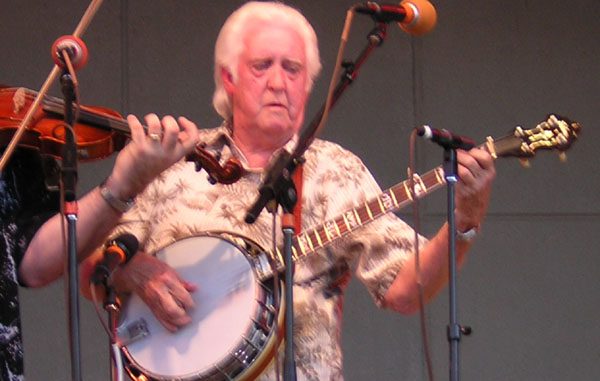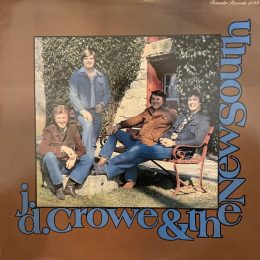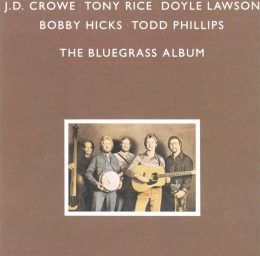
Bandleader and banjo player who helped change bluegrass and ensure its ongoing relevance.
 The acoustic music and bluegrass worlds were saddened last year when guitar legend Tony Rice passed away on Christmas Day. That sense of sadness and loss was repeated this year with the news that banjoist and bandleader J. D. Crowe passed away on Christmas Eve from undisclosed causes. The musicians also had a shared history which included the recording of one of the foundation stones of progressive bluegrass in 1975, the legendary ‘ The New South’ album that is so famous it is often referred to simply by its catalogue number “0044”. The pair hooked up again when they founded The Bluegrass Album Band to play the music by the likes of Bill Monroe, Flatt and Scruggs, and The Stanley Brothers in an attempt to reacquainted progressive bluegrass fans with the music of the genre’s founding fathers. As someone who brought non-bluegrass tunes to the bluegrass canon, developed his own style of banjo playing, and helped develop a new generation of bluegrass stars, J. D. Crowe can claim to have been as influential as his own bluegrass heroes, including the legendary Lester Flatt.
The acoustic music and bluegrass worlds were saddened last year when guitar legend Tony Rice passed away on Christmas Day. That sense of sadness and loss was repeated this year with the news that banjoist and bandleader J. D. Crowe passed away on Christmas Eve from undisclosed causes. The musicians also had a shared history which included the recording of one of the foundation stones of progressive bluegrass in 1975, the legendary ‘ The New South’ album that is so famous it is often referred to simply by its catalogue number “0044”. The pair hooked up again when they founded The Bluegrass Album Band to play the music by the likes of Bill Monroe, Flatt and Scruggs, and The Stanley Brothers in an attempt to reacquainted progressive bluegrass fans with the music of the genre’s founding fathers. As someone who brought non-bluegrass tunes to the bluegrass canon, developed his own style of banjo playing, and helped develop a new generation of bluegrass stars, J. D. Crowe can claim to have been as influential as his own bluegrass heroes, including the legendary Lester Flatt.
James Dee Crowe was born in Lexington, Kentucky, on August 27th, 1937, and while his first musical instrument was the guitar all that changed when he heard Flatt and Scruggs at a barn dance in 1949 and he switched to the banjo. He joined ex-Bluegrass Boy Jimmy Martin’s Sunny Mountain Boys when he was 19 and stayed for four years, establishing his own banjo style which influenced fellow banjo players. Crowe formed his own Kentucky Mountain Boys in 1961 and largely played to a local Kentucky audience. Band members included subsequent bluegrass greats Doyle Lawson and Larry Rice, brother of Tony, a future member of Dickey Betts ‘Highway Call’ touring band, and friend and recording partner of Chris Hillman and Herb Pedersen. Their two locally released albums ‘Bluegrass Holiday’ and ‘Model Church’ hinted at a new emerging newgrass style. The band changed their name to J. D. Crowe & The New South and released two albums before the genre changing record ‘The New South’ in 1975. The album’s success also helped the then-new Rounder Records to establish itself and eventually become the major roots music label it is today.
Crowe changed his band’s name when Tony Rice joined in 1971 on guitar and vocals to provide more flexibility in the type of music they could play. In various interviews, Crowe explained that his reason for developing a new approach to bluegrass was simply for the practical reason of not wanting to make inferior copies of other musicians’ work which would  not have developed an audience. It was Crowe who advised Rice not to ignore his vocal ability while continuing to develop his guitar skills, and Tony Rice’s vocals were an integral part of The New South’s sound. By the time they recorded ‘The New South’ the band included Ricky Skaggs on vocals and mandolin, Jerry Douglas on Dobro, and Bobby Slone on bass and fiddle. The album was a celebration of the talents of all the musicians on the recording playing tunes by Rodney Crowell, Fats Domino, Gordon Lightfoot, Ian Tyson, The Dillards, Utah Phillips as well as traditional tunes and a cover of an Earl Scruggs tune. This album brought Tony Rice’s vocals and guitar work to a new audience and the new standards of musical interplay with a mix of songs from various genres set the template for the newgrass movement of the ‘70s with its musical sophistication and non-traditional song list. By 1981 Tony Rice was one of the leading stars of newgrass, but he was keen to show his fans where bluegrass came from so he recorded an album of traditional bluegrass tunes called ‘The Bluegrass Album’. Rice asked Crowe to be part of the album where they played old tunes in the new style, and it was so successful there were a further five albums by what subsequently came to be called The Bluegrass Album Band. The Bluegrass Album Band also included some country rock tunes on later albums including ‘Devil In Disguise’ by the Flying Burrito Brothers. The New South remained active until 2019 when Crowe’s health meant he had to retire from touring. The New South had continued to include new and young musicians who went on to their own individually successful careers, including Keith Whitley. Crowe won a Grammy in 1983 for his tune ‘Fireball’ and had further Grammy nominations and multiple other awards reflecting his stature as a musician, and also how bluegrass as a genre had managed to maintained its relevance.
not have developed an audience. It was Crowe who advised Rice not to ignore his vocal ability while continuing to develop his guitar skills, and Tony Rice’s vocals were an integral part of The New South’s sound. By the time they recorded ‘The New South’ the band included Ricky Skaggs on vocals and mandolin, Jerry Douglas on Dobro, and Bobby Slone on bass and fiddle. The album was a celebration of the talents of all the musicians on the recording playing tunes by Rodney Crowell, Fats Domino, Gordon Lightfoot, Ian Tyson, The Dillards, Utah Phillips as well as traditional tunes and a cover of an Earl Scruggs tune. This album brought Tony Rice’s vocals and guitar work to a new audience and the new standards of musical interplay with a mix of songs from various genres set the template for the newgrass movement of the ‘70s with its musical sophistication and non-traditional song list. By 1981 Tony Rice was one of the leading stars of newgrass, but he was keen to show his fans where bluegrass came from so he recorded an album of traditional bluegrass tunes called ‘The Bluegrass Album’. Rice asked Crowe to be part of the album where they played old tunes in the new style, and it was so successful there were a further five albums by what subsequently came to be called The Bluegrass Album Band. The Bluegrass Album Band also included some country rock tunes on later albums including ‘Devil In Disguise’ by the Flying Burrito Brothers. The New South remained active until 2019 when Crowe’s health meant he had to retire from touring. The New South had continued to include new and young musicians who went on to their own individually successful careers, including Keith Whitley. Crowe won a Grammy in 1983 for his tune ‘Fireball’ and had further Grammy nominations and multiple other awards reflecting his stature as a musician, and also how bluegrass as a genre had managed to maintained its relevance.
J.D. Crowe was a true legend of the five string banjo who also changed and modernised bluegrass in the early ‘70s and thereby ensuring its ongoing development which we can hear today. ‘The New South’ record had a massive influence on a young Alison Krauss to such an extent it is doubtful she would have had the career she has had if she hadn’t heard J. D. Crowe. His nurturing of Tony Rice, Ricky Skaggs, and Jerry Douglas meant that Crowe helped influence the development not only of bluegrass but acoustic music generally including country and americana. It is inconceivable to think of any banjo player who was not influenced to some extent by Crowe’s style of playing, and Bela Fleck, who knows about these things, has called him one of the greatest ever five string banjo players. Guitarist Billy Strings tweeted “He was an absolute legend. He will be remembered as one of the greatest to ever play bluegrass music. He had tone, taste and TIMING like no other.”, clear evidence that Crowe’s influence is as strong today as it has ever has been.


